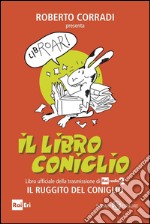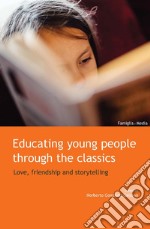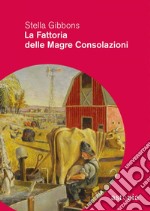Romanzi Classici eBooks
eBooks con argomento Romanzi Classici di Formato Epub
Il libro coniglio: Libro ufficiale della trasmissione di Rai Radio2 Il ruggito del coniglio. E-book. Formato EPUB Aa.Vv. - Salani Editore, 2015 -
UN GRANDE LIBRO PIENO DI LIBRI SCRITTO A MOLTISSIME MANI E RACCOLTO CON MOLTO AMORE E MOLTE RISATE DA ROBERTO CORRADI E I MASTRI CONTINUOLOGI DEL RUGGITO DEL CONIGLIO, CON LA PREZIOSISSIMA COMPLICITÀ DI MARCO PRESTA E ANTONELLO DOSE.«Non sappiamo se esista una vita oltre la vita, ma un finale oltre il finale esiste sempre. Cosa accadrà ad Achab dopo che si è inabissato insieme all'odiata Moby Dick? Come si comporterà il Conte di Montecristo dopo aver ottenuto la tanto agognata vendetta? I promessi sposi, dopo l'inevitabile cerimonia, saranno felici o lei tornerà da mammà? Prima che Bruno Vespa decida di fare un plastico sul dottor Jekyll e mister Hyde, abbiamo chiesto a un gruppo di esseri umani che per comodità chiameremo ‘pubblico’ di scatenare la fantasia e proseguire alcune grandi trame letterarie. Purtroppo lo hanno fatto e il risultato è contenuto in questo libro». Marco Presta e Antonello Dose.Insomma, che ogni cosa debba avere una fine è risaputo; che ogni fine possa avere un seguito, invece, è un geniale esercizio della fantasia. Ne sanno qualcosa gli ascoltatori del Ruggito del coniglio – trasmissione di culto, in onda da vent’anni sulle frequenze di Rai Radio2 e seguita tutte le mattine da quasi due milioni di persone – che hanno prestato la loro penna e la loro immaginazione per creare i ‘prosiegui’ di dieci grandi classici, tra cui I promessi sposi, Il conte di Montecristo, L’Odissea, Canto di Natale, Il nome della rosa e perfino 50 sfumature di grigio (che stanno bene su tutto).
Educating Young People through the Classics: Love, Friendship and Storytelling. E-book. Formato EPUB Noberto González Gaitano - Edusc, 2020 -
What films and TV series do young people enjoy most? What books do they read most? Do they prefer novels based on the ever-changing preferences of mainstream critics, or do they prefer classic masterpieces that have survived the test of time? How are young people’s views on love and friendship influenced by novels, movies, and television series? Are there significant differences in their choices due to cultural and linguistic traditions? A sample of 3,694 people between 18 and 29 years old was selected and interviewed to answer these questions in May-June 2018 in nine western countries: Argentina, Colombia, France, Germany, Italy, Mexico, Spain, the UK, and the USA. The Spanish pollster GAD 3 has carried out the survey under the direction of the Family and Media Center and with the financial support of the Elina Gianoli Gainza Chair of Family and Media Studies at the Pontifical University of the Holy Cross (Pontificia Università della Santa Croce, Rome). This book is hinged to the awareness that the West is in the midst of an epochal educational crisis, and the project is strengthened by the belief, which is shared by its promoters, that one of the ways out of the crisis is the recovery of narrative intelligence. Besides the presentation of the multinational survey results, the book offers a reflection on six great works of literature – later adapted to the big screen – that have addressed these universal themes in different times, in order to cultivate an appreciation of great stories and promote an educational culture concerned with the development of thought and the ability to critically analyze. Their authors share a strong educational sensitivity and experience in education and bring together their diverse media expertise. The authors and works mentioned are: Alessandro d’Avenia (The Odyssey by Homer, The Divine Comedy by Dante, and Crime and Punishment by Fyodor Dostoyevsky); Natalia Sanmartín Fenollera (Pride and Prejudice by Jane Austen); Armando Fumagalli (Anna Karenina by Lev Tolstoj); Travis Curtright (Much Ado about Nothing by William Shakespeare); Antonio Malo (Somerset Maugham’s The Painted Veil); and Andrea Monda (J.R.R. Tolkien’s The Lord of the Rings). Norberto González Gaitano (Alcaraz, Spain) is a professor of public opinion at the School of Church Communications at the Pontifical University of the Holy Cross (Rome) and is the author of a number of books and scholarly articles. Formerly a professor of ethics of communication at the University of La Laguna (1990-1996) and at the University of Navarra (1981-1991), both located in Spain, he has also been a visiting research scholar at the University of Chicago (2008-2009) and the Catholic University of America (Washington, 1995). He has been a Consultant to the Pontifical Council for Social Communications. Norberto González Gaitano is currently the Director of the Center for Family and Media Studies at the Pontifical University of the Holy Cross (Pontificia Università della Santa Croce, Rome).
La fattoria delle Magre Consolazioni. E-book. Formato EPUB Stella Gibbons - Astoria, 2011 -
«Per carità, non perdetevi ‘La Fattoria delle Magre Consolazioni’. Si ride di gusto a ogni pagina e si capiscono molte cose sulle donne, gli uomini, e la letteratura. È scritto con eccentrica grazia e sguardo senza pietà per nessuno.»Il Sole 24 Ore - Laura Lepri«Una delle storie più divertenti della letteratura anglosassone.»L'Espresso - Mario FortunatoUna raffinata educazione serve a poco se ci si ritrova orfane, a vent’anni, senza un soldo e incapaci di guadagnarsi da vivere. È così che Flora va a vivere nel Sussex, presso alcuni lontani parenti che hanno una fattoria dal nome davvero poco attraente: la Fattoria delle Magre Consolazioni. In più, i parenti sono parecchio eccentrici, la fattoria è in rovina e la matriarca – che ha smarrito la ragione dopo aver visto “qualcosa di orribile nella legnaia” settant’anni prima – domina sulla famiglia intera. Novella Alice nel Paese delle (non) Meraviglie, Flora non si lascia intimidire da quella follia diffusa e, armata di buonsenso e determinazione, cerca di raddrizzare fattoria e famiglia… Trascinante e sorprendente, La Fattoria delle Magre consolazioni è stato definito dal Sunday Times “il libro più divertente che sia mai stato scritto”.


